If I could say anything to Itamura Tomoyuki, it would be one word – “decaf”.
 I like The Case Study of Vanitas – truly, I do. But in terms of the direction, seriously, man – relax. This is a good story, with good animation – it doesn’t need all this fluff and flannel to work. It’s one thing if we’re talking about a Shaft LN adaptation with wafer-thin writing and cheap-looking-visuals – take away the trickery and twitchiness and there’s basically nothing left. But Vanitas doesn’t need all that, which means it just gets in the way. Some weeks are better than others but with this episode the direction especially grated on me.
I like The Case Study of Vanitas – truly, I do. But in terms of the direction, seriously, man – relax. This is a good story, with good animation – it doesn’t need all this fluff and flannel to work. It’s one thing if we’re talking about a Shaft LN adaptation with wafer-thin writing and cheap-looking-visuals – take away the trickery and twitchiness and there’s basically nothing left. But Vanitas doesn’t need all that, which means it just gets in the way. Some weeks are better than others but with this episode the direction especially grated on me.
 There is a matter of talent to consider here, of course. This style of direction is a balancing act very few are capable of pulling off – Matsumoto Rie being the one who most prominently comes to mind for me. Part of it is the sheer artisanship of her trickery, and part that she knows she has to ease off the gas sometimes. If one had time to burn a re-watch of some of Kekkai Sensen in comparison with Vanitas would illustrate the point brilliantly. But while I’d never be disappointed in Rie as a directorial pick, I don’t even think Vanitas especially lends itself to this style. Andou Masahiro would have been my choice (and Kimura Ryouhei as Vanitas) – this show in the style of Zetsuen no Tempest would have been an orgy for the senses.
There is a matter of talent to consider here, of course. This style of direction is a balancing act very few are capable of pulling off – Matsumoto Rie being the one who most prominently comes to mind for me. Part of it is the sheer artisanship of her trickery, and part that she knows she has to ease off the gas sometimes. If one had time to burn a re-watch of some of Kekkai Sensen in comparison with Vanitas would illustrate the point brilliantly. But while I’d never be disappointed in Rie as a directorial pick, I don’t even think Vanitas especially lends itself to this style. Andou Masahiro would have been my choice (and Kimura Ryouhei as Vanitas) – this show in the style of Zetsuen no Tempest would have been an orgy for the senses.
 But anime directors (and studios) are like family – we don’t get to choose. The challenge is to focus on Vanitas no Carte for what it is rather than what it could have been, and it remains a very good watch. This was very much a mythology episode, laying the groundwork for Mochizuki’s larger story to come. That starts with the meeting with Ruthven, who’s initially polite and cordial with Vanitas, even thanking him (and Noe) for his actions at the party. The secret with Lucius turns out to be pretty straightforward – he’s actually the Grand Duke, the second-highest ranking vampire there is. Though his uncle is fulfilling all of the actual responsibilities of the position.
But anime directors (and studios) are like family – we don’t get to choose. The challenge is to focus on Vanitas no Carte for what it is rather than what it could have been, and it remains a very good watch. This was very much a mythology episode, laying the groundwork for Mochizuki’s larger story to come. That starts with the meeting with Ruthven, who’s initially polite and cordial with Vanitas, even thanking him (and Noe) for his actions at the party. The secret with Lucius turns out to be pretty straightforward – he’s actually the Grand Duke, the second-highest ranking vampire there is. Though his uncle is fulfilling all of the actual responsibilities of the position.
 Spare a thought for Luca here, as his life is one giant ball of frustration. He can’t court the woman he loves because he’s too young. He can’t perform the duties he’s inherited because he’s too young. For a boy, raging at seeing men get all the things you want (paging Dr. Freud) is part of the experience of growing up, but it’s especially acute for him. He also lets Ruthven down by taking Vanitas’ bait – and bait it was – in speculating that the Queen was dead. In truth she seems very incapacitated rather than demised, but Vanitas’ speculation was clearly on the money. He’s utterly fearless, I’ll give him that, but damn – surely there are times Vanitas could employ just a bit of decorum and avoid dancing with death quite so intimately.
Spare a thought for Luca here, as his life is one giant ball of frustration. He can’t court the woman he loves because he’s too young. He can’t perform the duties he’s inherited because he’s too young. For a boy, raging at seeing men get all the things you want (paging Dr. Freud) is part of the experience of growing up, but it’s especially acute for him. He also lets Ruthven down by taking Vanitas’ bait – and bait it was – in speculating that the Queen was dead. In truth she seems very incapacitated rather than demised, but Vanitas’ speculation was clearly on the money. He’s utterly fearless, I’ll give him that, but damn – surely there are times Vanitas could employ just a bit of decorum and avoid dancing with death quite so intimately.
 Ruthven is calculating to be sure – his “rage” at Vanitas was clearly a show of what would be expected if Vanitas was wrong, though Luca spoiled the act. And if I’m not mistaken this was the first time we’ve heard Sensei referred to as “the shapeless one”. Noe and Vanitas are banished back to human Paris, where Orlock is less than pleased with the results of their trip. But there’s a new case to be dealt with, the disappearances of curse-bearers. Dante shows up, and it turns out that he and his two cohorts are dhampirs, vampire-human hybrids. He’s convinced that it’s the church’s chasseurs that are behind it, which prompts a trip to the catacombs (even then and even here a tourist trap).
Ruthven is calculating to be sure – his “rage” at Vanitas was clearly a show of what would be expected if Vanitas was wrong, though Luca spoiled the act. And if I’m not mistaken this was the first time we’ve heard Sensei referred to as “the shapeless one”. Noe and Vanitas are banished back to human Paris, where Orlock is less than pleased with the results of their trip. But there’s a new case to be dealt with, the disappearances of curse-bearers. Dante shows up, and it turns out that he and his two cohorts are dhampirs, vampire-human hybrids. He’s convinced that it’s the church’s chasseurs that are behind it, which prompts a trip to the catacombs (even then and even here a tourist trap).
 The headline here is not that sideshow, but the hidden catacombs that Vanitas intends to visit on his own before Noe refuses to take no for an answer. The entrance is hidden under the floor of Notre Dame, and as Noe notices, Vanitas seems very certain of where he’s headed right from the beginning. This is highly suggestive where Vanitas’ past is concerned of course, another bit of foreshadowing perhaps. In this secret labyrinth the pair stumble across Roland Fortis (Kawanishi Kengo), who we know to be a major player in the chasseur hierarchy. But here Roland pretends to be lost, all to lure Vanitas into a trap and isolate Noe, who he’s managed to deduce is a vampire.
The headline here is not that sideshow, but the hidden catacombs that Vanitas intends to visit on his own before Noe refuses to take no for an answer. The entrance is hidden under the floor of Notre Dame, and as Noe notices, Vanitas seems very certain of where he’s headed right from the beginning. This is highly suggestive where Vanitas’ past is concerned of course, another bit of foreshadowing perhaps. In this secret labyrinth the pair stumble across Roland Fortis (Kawanishi Kengo), who we know to be a major player in the chasseur hierarchy. But here Roland pretends to be lost, all to lure Vanitas into a trap and isolate Noe, who he’s managed to deduce is a vampire.
 As canny as Vanitas usually is, he’s taken in rather thoroughly by Roland here. The chasseurs may not be the antagonists in the larger story (or who knows, they might) but as an organization whose entire avowed purpose is killing vampires they’re clearly not sympathetic under this premise. Is there room for temporary alliance with them if they have a common enemy (such as Charlatan, theoretically), or are they such ideologues that any such rapprochement is impossible? That answer to that question may start revealing itself next week.
As canny as Vanitas usually is, he’s taken in rather thoroughly by Roland here. The chasseurs may not be the antagonists in the larger story (or who knows, they might) but as an organization whose entire avowed purpose is killing vampires they’re clearly not sympathetic under this premise. Is there room for temporary alliance with them if they have a common enemy (such as Charlatan, theoretically), or are they such ideologues that any such rapprochement is impossible? That answer to that question may start revealing itself next week.










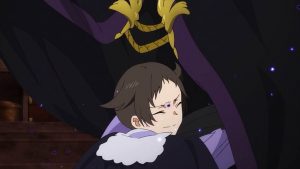




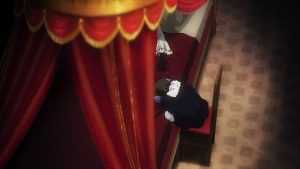






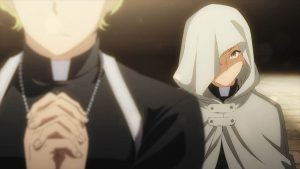










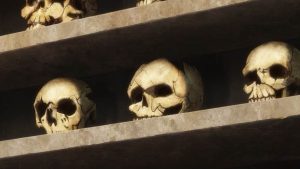


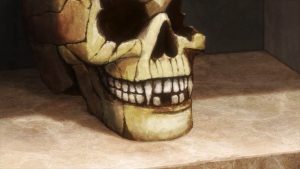

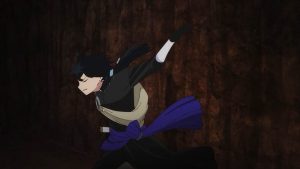



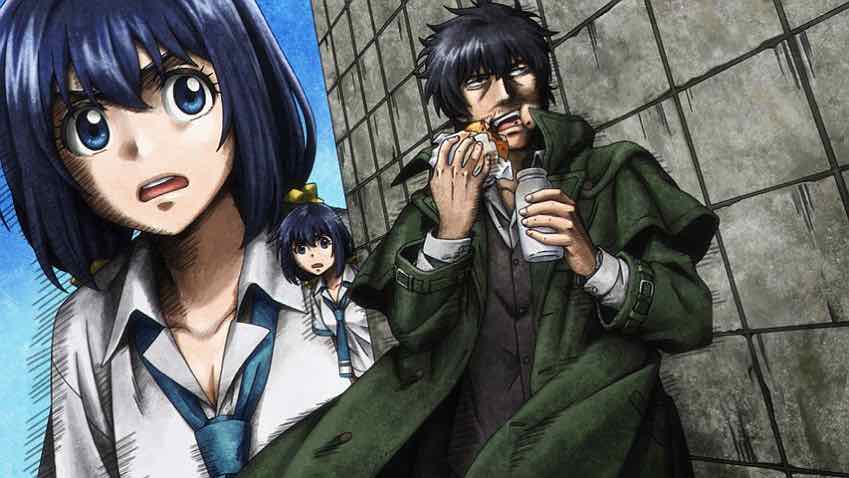
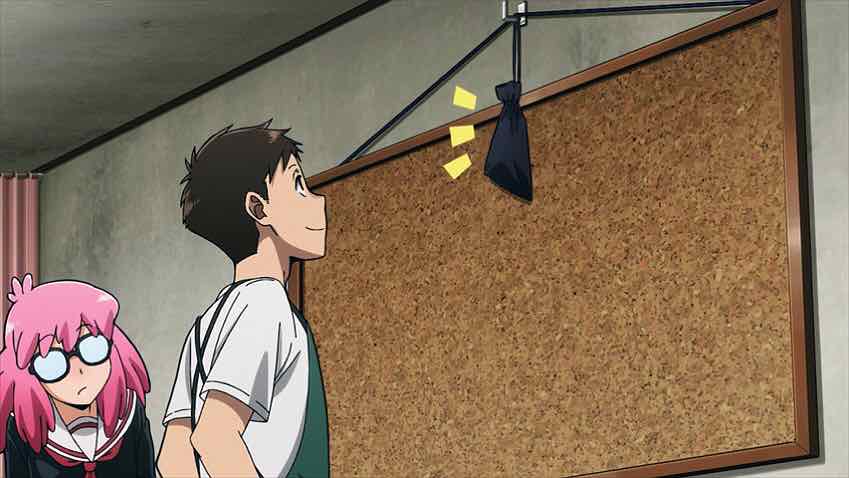
nellie
August 21, 2021 at 1:06 pmI wonder why Ruthven sounded so chilly when Noe mentioned Luca’s older brother.
Guardian Enzo
August 21, 2021 at 2:04 pmHard to say. It could just be because it’s a very uncomfortable topic and one that’s been forbidden from discussion inside the (very noble) family.